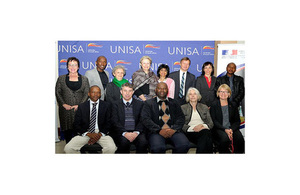UKinSouthAfrica mark Climate Diplomacy Day
UKinSouthAfrica mark Climate Diplomacy Day and share UK core climate messages in South Africa.

High Commissioner Judith Macgregor and participants at the Climate Diplomacy Day event
BHC Pretoria teamed up with the EU delegation, German, Danish, French and US embassies here to mark Climate Diplomacy Day, and promote our core climate messages to a SA audience. Our event was hosted by University of South Africa (UNISA) – one of SA’s leading universities - on the morning of Wednesday 17th June and attracted a full crowd looking to engage on our theme of Why We Cannot Fail: Road towards a Climate Change Agreement in Paris.
The event was opened by a representative of UNISA’s Vice-Chancellor. Vice-Principal Professor Divya Sinch emphasised the importance of climate action from a societal and business standpoint, as well as a personal one. She stressed the need for urgent action to prevent dangerous climate change: “the future is now.”
EU, French and German HoMs used the platform to stress the need for global climate action, the importance of the Paris COP and convey EU unity on the agenda. The German spoke of how economic development could/should go hand in hand with a move to low carbon. An industrialised nation like Germany had still chosen to successfully pioneer energy efficiency and renewables. In her speech, the High Commissioner called for an ambitious deal in Paris, explained the steps being taken by the UK (including on renewables), and highlighted our climate-related projects in South Africa, including via the Prosperity Fund (Judith’s speech attached).
A subsequent panel discussion included Simon Cardy from DIRCO, representing SA Government, Louise Naude from WWF, Xolisa Ngwadla from the Council for Scientific and Industrial Research (CSIR) and a postgraduate student from UNISA. The discussion was frank and held together by the common thread of SA’s developing nation status and how it plays into what can be expected in terms of climate action. Cardy positioned SA as the leading African nation (and one of the leading emerging economies) pressing for an ambitious deal, with a strong emphasis on a deal being legally binding: there could be no place for a “go it alone system”. He noted the risk of a political deal which might not fulfil the basic science/climate requirements – the numbers had to add up. Naude (WWF) was moderately positive about SA’s climate credentials but urged SA to match rhetoric to reality and decommission all coal plants (as well as rule out shale gas and nuclear!).